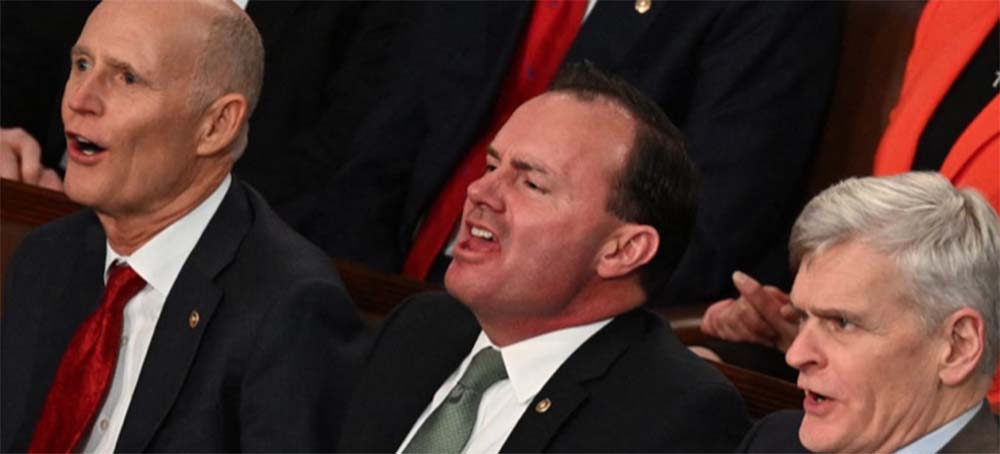Live on the homepage now!
Reader Supported News
The 2024 Republican primary isn't going to get ugly — it already is
Trump has been doing just that on Tuesday, though, sharing a few posts on Truth Social purporting to show DeSantis “grooming high school girls with alcohol as a teacher.”
“That’s not Ron, is it?” Trump wrote, sarcastically. “He would never do such a thing!”
Trump going heavy on the "DeSantis is a pedophile" stuff today. pic.twitter.com/LS2zRpke3z
— Will Sommer (@willsommer) February 7, 2023
The New York Times reported last year on DeSantis’ time as a teacher at the Darlington School in northwest Georgia. The report notes that several students described DeSantis as “a frequent presence at parties” with seniors at the school. “As an 18-year-old, I remember thinking, ‘What are you doing here, dude?’” one former student told the Times.
The photo Trump shared on Tuesday was originally published in 2021 by a Democratic blog called The Hill Reporter, which noted that the girls in the photo were seniors when it was taken in 2002.
DeSantis responded to Trump’s posts on Wednesday. “I spend my time delivering results for the people of Florida and fighting against Joe Biden,” he said. “That’s how I spend my time. I don’t spend my time trying to smear other Republicans.”
BREAKING: DeSantis responds to Trump ReTruth accusing him of being a "groomer"
— Florida’s Voice (@FLVoiceNews) February 8, 2023
"I'd just say this. I spend my time delivering results for the people of Florida and fighting against Joe Biden [...] I don't spend my time trying to smear other Republicans." pic.twitter.com/Ddj9Mb1MYj
Trump’s line of attack comes as DeSantis seeks to establish himself as the Republican Party’s leading culture warrior, in part by stoking fear over pedophiles and groomers. The governor’s “Don’t Say Gay” law, which prohibits the discussion of gender identity in lower grades of Florida public schools, was widely marketed as an anti-groomer bill, the idea being that educators had been “grooming” young children for sex. DeSantis’ press secretary, Christina Pushaw, last year accused opponents of the then-bill of being groomers themselves, and right-wing activists quickly descended on Disney after the company came out against the legislation. DeSantis is still trying to punish Disney for doing so.
Trump’s Truth Social posts on Tuesday come amid a torrent of attacks against the governor. The former president has recently called DeSantis a “globalist” and a friend to Jeb Bush, while accusing him to bowing to pressure to implement Covid-19 mitigation measures toward the beginning of the pandemic. He’s also whined that DeSantis should be loyal considering it was Trump’s endorsement that helped him win his 2018 gubernatorial run. “Ron DeSantis got elected because of me. He had nothing. He was dead. He was leaving the race. He came over and he begged me. He begged me,” Trump told Hugh Hewitt last week. “He said if you endorse me I’ll win. There were tears coming down from his eyes. He said if you endorse me I’ll win.”
READ MORE  Russian PM Mikhail Mishustin and Russian President Vladimir Putin (photo: AP)
Russian PM Mikhail Mishustin and Russian President Vladimir Putin (photo: AP)
“Hence, Russia’s ‘arms race’ continues among the main political players, who are actively creating private armies, following the example of Yevgeny Prigozhin’s private military company Wagner,” the statement reads.
The Wagner Group, Russia’s most high-profile state-controlled mercenary group founded by Russian oligarch Prigozhin, participates in the war against Ukraine alongside the regular Russian army.
Wagner has been accused of human rights abuses such as torture and extrajudicial killings in Ukraine, Syria, Libya, the Central African Republic, Sudan, and Mozambique.
Ukraine’s parliament recognized Wagner as an international criminal organization and called on foreign governments to do the same on Feb. 6.
Earlier on Jan. 26, the U.S. Treasury Department designated Wagner as a “significant transnational criminal organization” and imposed sanctions on its support network worldwide.
“Wagner personnel have engaged in an ongoing pattern of serious criminal activity, including mass executions, rape, child abductions, and physical abuse in the Central African Republic and Mali,” the Treasury said.
READ MORE  Antakya, Turkey. (photo: NYT)
Antakya, Turkey. (photo: NYT)
The death toll from the devastating earthquake in Turkey and Syria rose as rescuers faced shortages of trucks, fuel and time. President Recep Tayyip Erdogan of Turkey visited the area near the epicenter.
Many were angry that it was taking so long for rescue crews with heavy machinery to arrive. In Kahramanmaras, where President Recep Tayyip Erdogan of Turkey visited on Wednesday, three bodies were recovered from a six-story building and there were at least six more victims in the rubble. “The volunteers were here, but not the state,” said a relative of two of the victims.
Buildings fell across streets all across southern Turkey, rendering them impassible, and a fire station in Pazarcik was turned into a makeshift funeral home. Cracks in the walls of buildings that still stood were wide enough to reach through. Broken glass litters the ground, threatening to slash the feet of survivors, many of whom are shoeless and still in the sleeping clothes they wore when the quake struck two days ago.
Here are key developments:
- The death toll in Turkey has passed 12,000, according to Turkey disaster management agency, the state Andalou News Agency reported early Thursday. In total, 12,391 people have died and 62,914 have been injured, according to the agency, known by its Turkish initials as AFAD.
- Mr. Erdogan, Turkey’s paramount politician for 20 years, made his first visit to the disaster zone on Wednesday to tell his people how much his government had already done to help, while urging that citizens “show patience” as more aid made its way to them. But the leader of the country’s largest opposition party rejected a call for unity, saying that Mr. Erdogan was “fully responsible.” Criticism of the government’s disaster response would only add to headwinds for Mr. Erdogan’s quest for re-election in May.
- Syria’s more than decade-long civil war is complicating efforts to get aid to the country. Many refugees displaced by the fighting live in the quake-stricken area of Turkey, and while aid was not crossing into Syria, bodies were.
- The humanitarian crisis has prompted Turks around the world to rally together and raise money and gather supplies to send home. Their efforts ranged from a bake sale in London to the gathering of donations at a nursing home in Berlin.
- In Turkey, Mr. Erdogan said rescue missions will focus on some of the hardest-hit provinces in Turkey: Hatay, Adiyaman and Kahramanmaras. In Syria, where more than a decade of civil war had already created a humanitarian crisis, at least 3,042 people died in the quake, according to the state Health Ministry and the White Helmets relief group.
READ MORE  Sens. Rick Scott and Mike Lee jeer as President Joe Biden describes their positions on Social Security accurately during the State of the Union address on Tuesday. (photo: Andrew Caballero-Reynolds/Getty Images)
Sens. Rick Scott and Mike Lee jeer as President Joe Biden describes their positions on Social Security accurately during the State of the Union address on Tuesday. (photo: Andrew Caballero-Reynolds/Getty Images)
In the portion of his speech on the need to raise the debt limit, Biden said that “some of my Republican friends want to take the economy hostage unless I agree to their economic plans.” Speaker Kevin McCarthy, who had given his own remarks on the debt limit the day before to pre-but the attacks he knew would come, gave one of his many solemnly disappointed shakes of the head.
“Some Republicans want Social Security and Medicare to sunset,” Biden said, before being cut off by loud Republican jeering, punched up with individual shouts from the likes of Georgia Rep. Marjorie Taylor Greene, who pointed at the president yelling “liar!”
The scene was chaotic enough that Biden had to veer off-script and engage in a live policy dialogue with his detractors. That’s unusual, and thrilling for what’s otherwise become a stale tradition. He clarified, almost apologetically, that he wasn’t talking about all Republicans. And when some shouted at him to name these Republicans who wanted Social Security and Medicare to expire, Biden demurred.
“I’m politely not naming them,” he said, “but it’s being proposed by some.”
The prepared line in Biden’s speech, before he was interrupted, was that “some Republicans want Medicare and Social Security to sunset every five years.” The “some Republicans,” in this case, is one Rick Scott.
In his 11-point plan, sub-point 7 of point 6 reads: “All federal legislation sunsets in 5 years. If a law is worth keeping, Congress can pass it again.” The plan doesn’t single out Medicare and Social Security specifically, but these are programs that were established by federal legislation and would thus disappear under Scott’s proposal unless renewed every five years. This is an… impracticable idea. Congress can’t, and no one should want them to, rewrite all federal law every five years.
But the agenda’s out, and now Scott and his party have to live with it. Scott is, of course, capable of softening that language, or deleting it altogether, any time he wants to. He’s already watered down another bullet-point suggesting that all “Americans should pay some income tax to have skin in the game” after everyone pointed out that he was calling to raise taxes on the poorest half of Americans.
Given that he’s had a year to learn this lesson, you would think Scott might be changing his tune now. In releasing the plan last year, Scott had released a Republican agenda for Democrats to scour for attacks throughout the midterm elections (even though he insisted he was acting in his personal capacity). It was a direct challenge to Senate Minority Leader Mitch McConnell’s preferred election strategy of keeping the focus strictly on Democratic policies.
As we know, Republicans’ efforts to retake the Senate never materialized, with Democrats adding one seat to their threadbare majority. And even though the election has passed, Democrats have hardly forgotten about the political potency embedded in elements of Scott’s plan, which again he could still modify if he so chose.
But Scott still hasn’t done that with this agenda item. Even after a night to sleep on it, Scott woke up Wednesday defending his idea.
🧵 Last night, @JoeBiden rambled for a while, but it seems he forgot to share the facts:
— Rick Scott (@SenRickScott) February 8, 2023
In my plan, I suggested the following: All federal legislation sunsets in 5 yrs. If a law is worth keeping, Congress can pass it again.
This is clearly & obviously an idea aimed at dealing with ALL the crazy new laws our Congress has been passing of late.
— Rick Scott (@SenRickScott) February 8, 2023
@JoeBiden is confused…to suggest that this means I want to cut Social Security or Medicare is a lie, & is a dishonest move…from a very confused President.
Does he think I also intend to get rid of the U.S. Navy? Or the border patrol? Or air traffic control, maybe?
— Rick Scott (@SenRickScott) February 8, 2023
This is the kind of fake, gotcha BS that people hate about Washington.
I’ve never advocated cutting Social Security or Medicare and never would.
Is it clear and obvious, though, that this idea is “aimed at dealing with ALL the crazy new laws our Congress has been passing of late”? When we read “all federal legislation,” we think about more than the Inflation Reduction Act or the American Rescue Plan. Where to begin? We think of the Voting Rights Act or the Clean Water Act. We think of the establishment of the Department of Education. And we think of Medicare, Social Security, and Medicaid. These may not all be laws that Republicans want to scrap in their entirety. But they are ones that many Republicans would like to have a fresh leverage point over, every five years, to make cuts. For now, they believe their only real leverage point to tackle spending programs they believe are on “autopilot” is when it’s time to raise the debt ceiling, which is why we are where we are, with another looming debt ceiling crisis that threatens a brittle global economy.
Plenty of Republicans, including chairmen of important committees and caucuses in the House, have been muttering about using the debt limit to force changes to Medicare and Social Security. Even before the State of the Union, though, that was unlikely to be the path they pursued in negotiations. McCarthy for one—and Donald Trump, for another—understands that holding the global economy hostage in order to extract cuts to Medicare and Social Security would be the dumbest move in history. They would lose the policy fight, and the political damage could cost them the 2024 election. In his remarks the day before the State of the Union, McCarthy said that “cuts to Medicare and Social Security are off the table” for the debt limit negotiations.
Biden used his State of the Union to lock them into that position. As Republican protested his claim that “some” of them wanted to cut Medicare and Social Security, he said he was happy to see so much “conversion.”
“So folks, as we all apparently agree, Social Security and Medicare is off the books now, right?” Biden said. Applause broke out.
The one saving grace for Rick Scott? If it wasn’t his toxic plan Biden chose to highlight, it would have been someone else’s. There’s plenty of loose talk out there. It could have been Wisconsin Sen. Ron Johnson’s suggestion that mandatory spending programs be subjected to annual review. It could have been Utah Sen. Mike Lee’s 2010 vow to “to phase out Social Security, to pull it up from the roots and get rid of it.” Biden could have simply referenced Republicans’ efforts to cut Medicaid, a cornerstone of their 2017 Obamacare repeal plan, which quite nearly made it into law.
When put like that, though, Scott deserves some credit. One line from a brochure has had enough juice not just to survive a year in his opponents’ playbook, but to be the focal point of an unusually memorable State of the Union as an incumbent president prepares for reelection. It’s an achievement, showcasing the long, toxic shelf life of a poorly written idea.
READ MORE  Relatives of those killed at Robb Elementary School in Uvalde, Tex., stand with state Sen. Roland Gutierrez (D) during a news conference in Austin on Jan. 24. (photo: Eric Gay/AP)
Relatives of those killed at Robb Elementary School in Uvalde, Tex., stand with state Sen. Roland Gutierrez (D) during a news conference in Austin on Jan. 24. (photo: Eric Gay/AP)
No significant gun control bill or other legislation has been passed in Texas since the May 24 shooting that left 19 Robb Elementary students and two teachers dead. But Uvalde’s blunt-talking state senator and a coalition of parents said they are determined not to let one of the nation’s worst school shootings slide off the radar.
Sen. Roland Gutierrez (D) has filed 10 bills and two budget appropriation requests, and has 11 more legislative proposals in the works, including one in response to an investigation from The Washington Post, ProPublica and the Texas Tribune aimed at improving the emergency medical response to mass killings — addressing everything including gun safety and protections shielding law enforcement from lawsuits.
“This is personal to me. These people have become my friends,” Gutierrez said, pointing to the parents of three slain students. Each wore buttons and shirts with pictures of their children. “These people deserve more than what they got.”
The Democrat is facing a reluctant body of lawmakers that has consistently loosened restrictions on guns after mass killings and set aside a fraction of the state’s billion-dollar surplus toward mental health and school safety in recent years.
From the day of the shooting, a loose coalition of Uvalde families has been at the forefront of a movement to hold officials accountable and push for gun-safety measures — such as raising the gun purchasing age from 18 to 21.
They’ve marched. They’ve told their stories. They’ve joined forces with national anti-gun violence groups. And they challenged congressional leaders who later passed the first bipartisan bill addressing gun violence in decades last fall.
And now, they are planning to become a regular presence in Austin to meet individually with lawmakers and tell and retell their story for as long as it takes, Gutierrez said. Tuesday’s appearance marked the second time in recent weeks families have gathered at the legislature to push for reform. The brutality of Uvalde’s suffering has lingered long in the national consciousness, giving them a chance to “create a moment,” the senator said.
Republican Texas House Speaker Dade Phelan urged his colleagues last month to honor the Robb Elementary school shooting victims through “sensible meaningful change,” but defining what that looks like will be up to one of the most conservative state legislatures in the country.
Lt. Gov. Dan Patrick (R) has signaled a willingness to talk, Gutierrez said, and he sees room for compromise on school safety and mental health. He and his Democratic colleagues have asked for $2 billion to increase mental health access in rural Texas and another $2 billion for school safety measures such as bulletproof windows. Another bill wants to put an extra state law enforcement officer on every Texas school campus.
Gutierrez said he is hoping to build bipartisan support for a bill to enhance rural emergency responder communications and training to better coordinate between various agencies during a mass casualty event.
“We have the money,” the senator said. “We can afford to do this.”
An investigation by The Post, ProPublica and the Texas Tribune found that communication lapses further hampered the already critical 77-minute law enforcement delay in reaching injured students and teacher.
Three victims who emerged from the school with a pulse later died. In the case of two of those victims, critical resources were not available when medics expected they would be, delaying hospital treatment for teacher Eva Mireles, 44, and student Xavier Lopez, 10, records show.
For the families left to grieve after mass violence in Texas, change should not come at the expense of new horror.
“We have been working tirelessly to change the culture of gun violence in Texas” by asking for reasonable things such as background checks and red flag laws, said Rhonda Hart, whose daughter Kimberly Vaughan was shot and killed at Santa Fe High School in 2018.
But Hart said she watched in disappointment as Texas lawmakers proposed everything short of gun measures. After a while, they stopped taking calls and meeting with parents, she said. Then six days after the fourth anniversary of her daughter’s slaying, families in Uvalde were met with their own hell.
“We stand together so that no other family in this godforsaken state has to do this,” she said.
Despite recent high-profile shootings, lawmakers who support gun rights in Texas continue to hold broad support. In Uvalde County, residents voted in favor of Gov. Greg Abbot (R) over his Democratic opponent, Beto O’Rourke, in November. Gutierrez himself lost the county’s vote but won the overall midterm race. The father of one 9-year-old Robb Elementary victim ran as a write-in candidate for a local commissioner position but didn’t win.
As Gutierrez spoke Tuesday, the parents of several Uvalde families wept. One wore a shirt that read, “We’re not done.”
The senator said he is planning to unveil gun-specific bills in the coming weeks.
READ MORE  Anti-abortion pregnancy crisis centers have been known to use shady tactics to convince women to keep their pregnancies. (photo: Nicholas Kamm/AFP/Getty Images)
Anti-abortion pregnancy crisis centers have been known to use shady tactics to convince women to keep their pregnancies. (photo: Nicholas Kamm/AFP/Getty Images)
Exclusive: research finds ads directing women in two cities to crisis pregnancy centers when they search for abortion care
The research builds on previous findings detailing how Google directs users searching for abortion services to so-called crisis centers – organizations that have been known to pose as abortion clinics in an attempt to steer women away from accessing abortion care.
The researchers set up test accounts in three cities – Atlanta, Miami and Phoenix – for women of three different income groups suggested by Google: average or lower-income rate, moderately high-income rate and high-income rate. They then entered search terms like “abortion clinic near me” and “I want an abortion”. In Phoenix, 56% of the search ads shown to the test accounts representing low- to moderate-income women were for crisis centers, compared with 41% of those served to moderately high-income test accounts and 7% to high-income accounts. In Atlanta, 42% of ads shown to the lower-income group were for crisis pregnancy centers, compared with 18% for moderately high-income women and 29% for high-income women.
In Arizona and Florida abortion is banned after 15 weeks of pregnancy. In Georgia, it is banned after six weeks, at which point many people do not know they are pregnant.
“By pointing low-income women to [crisis pregnancy centers] more frequently than higher-income women in states with restrictive laws, Google may delay these women from finding an actual abortion clinic to get a legal and safe abortion,” says Katie Paul, the director of the Tech Transparency Project.
“The time window is critical in some of these states,” she adds.
Lower-income women are the group least likely to be able to travel for abortion care because traveling can cost thousands of dollars in lost work, transportation, babysitting and accommodation fees.
“Lower-income women are being targeted, and they’re the ones that are going to suffer the most under these policies,” Paul says.
The results were not the same in all cities. In Miami, researchers saw the inverse result: high-income women were more likely to get ads from crisis centers than lower-income women. The researchers say they cannot be certain why Miami diverged from the other cities but speculate that crisis pregnancy centers might more actively target low-income women in more restrictive states. (While Arizona and Florida both ban abortion after 15 weeks, the former has more restrictions layered on the 15-week limit.)
While pregnancy crisis centers offer pregnant women resources such as diapers and pregnancy testing, they have also been known to employ a number of shady tactics to convince women seeking an abortion to keep their pregnancies. Those include posing as abortion clinics online though they do not offer abortion care, refusing pregnancy tests for women who say they intend to have an abortion and touting widely disputed research about abortion care to patients. Crisis centers, which go largely unregulated despite offering medical services, have been known to target low-income women precisely because they find it harder to travel out of state for abortion care.
Although companies buying ads with Google can selectively target the groups they want to reach – including by income – Paul adds that many users won’t be aware they are being targeted by Google in this way.
“Google has a large share of influence, particularly in the United States when people are trying to search for authoritative information. And people generally tend to consider Google’s search engine as an equaliser. They think the results they get are the results that everyone’s going to get. But that’s just not the case,” Paul says.
Last year, Google came under fire after a Tech Transparency Project investigation found the company was serving people with ads for pregnancy crisis centers suggesting they offer abortions even though they do not – violating the platform’s own rules on misleading advertisements.
Google has repeatedly been pressed to make changes to its search engine to curtail these issues. In 2022, Senator Mark Warner of Virginia and Representative Elissa Slotkin of Michigan wrote to the company twice, urging it to stop misdirecting users searching for abortion care to these crisis centers in Google Maps. The lawmakers also called on Google to limit the way crisis centers appear in search results and ads, and to add disclaimers clearly indicating whether a search result is an organization that provides abortions or not.
Google responded by pledging to clearly label these facilities in the future. But researchers in the study also found a number of ads still being served to users suggesting centers offer abortion care when they do not.
In Phoenix, a Google search by a lower- or average-income test account for “Abortion fund” – an organization that provides financial and other forms of support for abortions – yielded an ad with the text “Free Abortion Help – 100% Confidential”, for a crisis center.
Similarly, when the lower- or average-income Atlanta test account searched for “Planned Parenthood Atlanta”, Google produced a single ad that read “Abortion Consultation for Free”, with an ad linking to a crisis pregnancy center called Health for Her in Atlanta. Although some of the ad results in the Tech Transparency Project’s study included a label stating “Does not provide abortions”, this one, along with several others, did not – in contravention of Google’s own labeling rules.
Slotkin said she was disappointed to learn the company is still failing to regulate crisis centers on its platform, despite having been in touch with them twice about the issue.
“Michigan has roughly 100 pregnancy crisis centers that explicitly do not provide abortions, and these clinics should not be listed among abortion providers,” Slotkin said.
“We sent a second letter in November because Google was still failing to consistently apply disclaimers to misleading ads. Despite our action – and assurance from Google that they would only show verified abortion providers when a woman was seeking the procedure – these findings from TTP [Tech Transparency Project] prove there’s clearly more work that needs to be done,” she said.
Senator Mark Warner’s office added: “Ads from ‘crisis pregnancy centers’ that reference ‘Free Abortion Help’ or ‘Abortion Consultation’ are obviously not in compliance with Google ads policies that forbid ads ‘that deceive users by excluding relevant product information or providing misleading information’. I urge Google to take action to prevent these deceptive advertising practices meant to trick users, especially low-income women.”
The Guardian contacted Google for comment and on Monday evening an unnamed spokesman sent a response.
“We don’t allow advertisers to specifically target a ‘low income’ bracket with ads, and we have strict rules about how location can be used to serve locally relevant ads. It’s important that people seeking abortion-related resources know what services an advertiser actually provides, so we require any organization that wants to target queries related to getting an abortion to be certified and clearly disclose whether they do or do not offer abortions. Last year, we updated these disclosures to make them more visible for users,” the response said.
READ MORE  The BP petroleum refinery in Gelsenkirchen, western Germany on March 8, 2022. (photo: Ina Fassbender/AFP/Getty Images)
The BP petroleum refinery in Gelsenkirchen, western Germany on March 8, 2022. (photo: Ina Fassbender/AFP/Getty Images)
BP now plans to increase its oil and gas production over the next seven years, reported The Guardian.
With other energy companies seeing windfalls — Shell reported $40 billion in profits last week — while people continue to struggle to pay their energy bills, there are calls for a heightened windfall tax for companies, BBC News reported.
“As millions struggle to heat their homes and put food on the table, BP are laughing all the way to the bank,” said General Secretary of the Trades Union Congress Paul Nowak, as reported by The Guardian.
BP CEO Bernard Looney had a plan to steer the company toward renewable energy sources and away from oil and gas, but now the company has said it will increase its yearly budget for fossil fuels and renewables by $1 billion each, while focusing more on developing hydrogen and biofuels, Reuters reported.
BP’s new plan to reduce oil production is less ambitious than before — 25 percent lower than 2019 levels instead of the previous goal of 40 percent.
The company’s plans to reduce emissions from consumer fuels have also fallen from 35 to 40 percent to 20 to 30 percent. It still has a goal of net zero by 2050.
BP’s energy transition businesses — like electric vehicle charging and renewables — currently make up about 30 percent of its budget, compared with three percent in 2019.
“If the bulk of your investments remain tied to fossil fuels, and you even plan to increase those investments, you cannot claim to be aligned” with the ambitions of the Paris Agreement to combat climate change, said Mark van Baal, founder of activist shareholder group Follow This, as reported by Reuters.
Looney said it wouldn’t come as a surprise if BP’s UK tax bill was more than $3 billion this year, saying the company paid $3.60 for every $4.80 it made in profits in the North Sea, The Guardian reported.
“Over the last three years all the profit we’ve made in the North Sea we’ve either paid it all away in tax or reinvested it into Britain,” Looney said, as reported by The Guardian.
BP said it would be passing more of its profits on to its shareholders by upping its quarterly dividend disbursement by 10 percent and buying back $2.75 billion of its own shares. In 2022, BP paid its shareholders more than $14 billion.
Follow us on facebook and twitter!
PO Box 2043 / Citrus Heights, CA 95611



No comments:
Post a Comment
Note: Only a member of this blog may post a comment.